|
|
|
Sort Order |
|
|
|
Items / Page
|
|
|
|
|
|
|
| Srl | Item |
| 1 |
ID:
167667
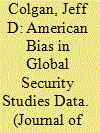

|
|
|
|
|
| Summary/Abstract |
Three major datasets contain problematic interpretative judgments, arguably biased toward the United States: the Polity dataset; Reiter and Stam's data on war outcomes; and Singh and Way's data on nuclear proliferation. These examples raise the possibility that important datasets in global security studies, and in political science more generally, are systematically affected by an American bias. Bias means that, non-Americans might code the same observations differently, on average. The issue arises because Americans, on average, seem to have certain predispositions that non-Americans, on average, do not have. Other nationalities have their own predispositions. I also demonstrate that each of the three empirical examples has significant implications for causal inferences, altering certain statistical findings based upon them. For instance, I reexamine Haber and Menaldo's study of the resource curse, showing that alternative data coding casts substantial doubt on their inferences.
|
|
|
|
|
|
|
|
|
|
|
|
|
|
|
|
| 2 |
ID:
167663
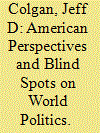

|
|
|
|
|
| Summary/Abstract |
Scholars of international relations (IR) from the United States, like any country, view the world with particular perspectives and beliefs that shape their perceptions, judgments, and worldviews. These perspectives have the potential to affect the answers to a host of important questions—in part by shaping the questions that get asked in the first place. All scholars are potentially affected by national bias, but American bias matters more than others. This special issue focuses on two issues: attention and accuracy in IR research. While previous scholarship has raised principally normative or theoretical concerns about American dominance in IR, our work is heavily empirical and engages directly with the field's mainstream neopositivist approach. The collected articles provide specific, fine-grained examples of how American perspectives matter for IR, using evidence from survey experiments, quantitative datasets, and more. Our evidence suggests that American perspectives, left unexamined, negatively affect our field's research. Still, the essays in this special issue remain bullish about the field's neopositivist project overall. We also offer concrete steps for taking on the problems we identify, and improving our field's scholarship.
|
|
|
|
|
|
|
|
|
|
|
|
|
|
|
|
| 3 |
ID:
142021
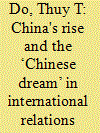

|
|
|
|
|
| Summary/Abstract |
The rise of China/East Asia and the perceived decline of the US/West pose an emerging question about how international relations (IR) theory should respond to this change. Increasingly, there have been heated discussions among Chinese IR academics over a desirable Chinese contribution to IR theory (IRT), particularly the possibility of building a distinctive Chinese IRT. Inevitably, this drive towards theorizing from a Chinese perspective also creates a backlash among not only Western but also other Chinese scholars as they question the ‘nationalistic’ if not ‘hegemonic’ discourse of the scholarship. Drawing on the sociology of scientific knowledge framework, this article examines the linkages between the vibrant dynamics of the Chinese theoretical debates and the actual practices of Chinese scholars in realizing their claims. It suggests that this investigation can serve as a springboard into a better appreciation of the theory–practice and power–knowledge relationships in the context of Chinese IR.
|
|
|
|
|
|
|
|
|
|
|
|
|
|
|
|
| 4 |
ID:
171960
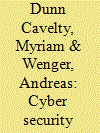

|
|
|
|
|
| Summary/Abstract |
In the last decade, cyber incidents have become more expensive, more disruptive, and in many cases more political, with a new body of theoretically informed research emerging in parallel. This article provides the intellectual history to situate this literature in its broader evolutionary context. After identifying and discussing six drivers from the fields of technology, politics, and science that have been influential in the evolution of cyber security politics and how it is studied, we describe three historically contingent clusters of research. Using the same driving factors to look into the future of research on cyber security politics, we conclude that it is a vibrant and diverse biotope that is benefitting from its interdisciplinarity, its relevance for policy, and its cognizance of the interplay between technological possibilities and political choices of state actors.
|
|
|
|
|
|
|
|
|
|
|
|
|
|
|
|
| 5 |
ID:
171788
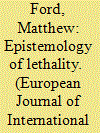

|
|
|
|
|
| Summary/Abstract |
The science of ammunition lethality is a field that seeks to define the point at which military ordnance takes life and produces death. By historicising lethality's epistemology, I reveal the intellectual fissures and scientific uncertainties that have been reified and embedded into contemporary conceptions of military power. This not only tells us something about the processes by which science is subordinated to war, but also offers a new lens from which to consider the way knowledge claims about battle are co-constructed and legitimated through military practices. As a result, this article places science back into a narrative that otherwise frames the ontology of war in terms of fighting.
|
|
|
|
|
|
|
|
|
|
|
|
|
|
|
|
| 6 |
ID:
132914
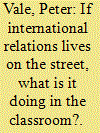

|
|
|
|
|
| Publication |
2014.
|
| Summary/Abstract |
The argument asserts that International Relations (IR) was (and remains) constructed to serve the interests of the knowledge courts of the north. In South Africa, the discipline is an 'alien species' because the imported idea of sovereignty not only disrupted natural patterns of regional migration, but the formation of the region's first state, the Union of South Africa, divided the country's people on the grounds of race. The coming of the Union followed upon both the Jameson Raid (1895/1896) and the Boer War (1899-1902) - the former was of interest to E.H. Carr in two instances but only as an attempt to explain events in the global north. The 'new' politics of southern Africa, which were based on sovereignty and the rise of Afrikaner Nationalism were ignored by Carr. The migration of IR to South Africa in the 1930s rested in an imperial frame, and the discipline helped create a European state in Africa. The author uses several autobiographical examples to suggest his own dissatisfaction with this condition by using Carr's notion of 'site-specificness'. The primacy of English in IR is critiqued because this language closes off perspectives of the international which are carried in other languages. The article concludes with a discussion of the way in which 'First People' are excluded by the deliberations around IR.
|
|
|
|
|
|
|
|
|
|
|
|
|
|
|
|
| 7 |
ID:
137603
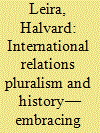

|
|
|
|
|
| Summary/Abstract |
This article approaches the possibility of achieving pluralist International Relations research through engagements with history/History. There are serious sociological and disciplinary challenges to achieving pluralism, most importantly related to the need to make a mark and a career in one specific discipline and the constant diversification of disciplines. Even so, drawing on the literature of amateurism, understood as engaging in an activity for the love of it, it is argued here that a spirit of engaged amateurism in dealing with history offers an important opportunity for exploring commonalities and fostering pluralism both within the discipline and across disciplinary boundaries.
|
|
|
|
|
|
|
|
|
|
|
|
|
|
|
|
| 8 |
ID:
101383


|
|
|
|
|
| Publication |
2010.
|
| Summary/Abstract |
In an attempt to broaden our perspective on IR theory formation, this article seeks to highlight the significance of ideology. Consistent with the recently revived sociology of knowledge tradition in international studies, we view IR scholarship as grounded in certain social and ideological conditions. Although some scholars have studied the political, ideological, and epistemological biases of Western, particularly American, civilization, in order to achieve a better understanding of global patterns of knowledge formation it is important to look at cases beyond the West. We therefore look at the formation of IR knowledge in Russia, and we argue that the development of a Russian theory of international relations responds to the old debate on the 'Russian idea,' and three distinct ideological traditions that had been introduced to the national discourse in the mid-19th century. Focusing on theories and concepts of the international system, regional order, and foreign policy, as developed by Russian scholars, we attempt to demonstrate how they are shaped by ideological and therefore pre-theoretical assumptions about social reality.
|
|
|
|
|
|
|
|
|
|
|
|
|
|
|
|
| 9 |
ID:
182443
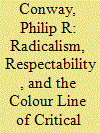

|
|
|
|
|
| Summary/Abstract |
The epithet ‘critical’ has become both coveted and contested. A long-established lodestone of personal, political, and professional commitment within academia, its meanings are multiple, and its histories are poorly understood. This article reconstructs an interdisciplinary history of debates concerning what it is to ‘be critical’, beginning in the 1930s but focusing on the late 1960s to the late 1990s. It argues the significance of the category ‘critical’ to be that it can connote political radicalism while allowing for a degree of professional respectability. Furthermore, the article shows that claims and counterclaims upon the parameters of criticality have privileged certain thought traditions. In particular, while contemporary discourses of ‘anti-wokeness’ caricature critical academics as being prepossessed with issues of coloniality and race, traditions of thought dealing with these issues have, until recently, been rather marginalised. The enduring ‘colour line’ of critical thought is not only unjust but also deleterious to political imagination.
|
|
|
|
|
|
|
|
|
|
|
|
|
|
|
|
| 10 |
ID:
168397
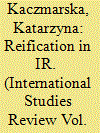

|
|
|
|
|
| Summary/Abstract |
This article studies the contentious problem of reification in international relations (IR) on the example of the idea of international society. It shows how the idea became reified, that is, how the move was made from approaching international society as one of several competing frameworks for the study of international politics to considering it an objective fact, a self-evident reality of international politics, and an entity in the possession of agency. For this purpose, I trace key writings of the English school and survey their contribution to the idea’s development and gradual reification. I posit that reification has been the outcome of individual strategies and disciplinary practices pertaining to the knowledge production process, in particular the perceived need to establish and maintain a research program while continuing to provide viable explanations of world events. In discussing the consequences, I argue that reification adversely affects not only research outcomes but also the study process. A reified category, once it becomes a default language through which to think and talk about international politics, narrows down avenues for diverging interpretations of international politics. Furthermore, endowing international society with agency hides real agents behind specific actions in international politics.
|
|
|
|
|
|
|
|
|
|
|
|
|
|
|
|
| 11 |
ID:
158279
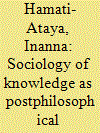

|
|
|
|
|
| Summary/Abstract |
This article first aims to draw attention to, and diagnose, the failure of IR’s sociological turn to extend the domain of sociological reason into the philosophical turf of epistemology and thereby fulfill the full promises of the postpositivist turn. Its second purpose is to revive and deploy the radical version of the sociology of knowledge that can achieve an autonomous reconstruction of epistemology suited to a reflexive, post-Kantian consciousness. The diagnosis begins by tracing the erasure of the radical sociological position in the connected evolutions of sociology and international relations (IR). It shows that the derailing of the “sociological revolution” was paradoxically mediated by the consolidation of social constructionism and science studies, reproduced in IR through their counterparts in the “sociological turn”: constructivism and the sociology of IR. In these otherwise reflexive developments, the progression of sociological reason was halted by a self-imposed limitation on the extension of sociological analysis to all domains of thought and the endorsement of an idealist and institutionalist ontology of the social. A reformulation of the forgotten, radical sociological position clarifies the implications for IR of a transition to a postphilosophical theory of knowledge and delineates an empirical research agenda for such a reconstruction of epistemology driven by a sociology of knowledge of a revolutionary persuasion. Exploring the centrality of social practice in the social determination of knowledge, the article argues that, and shows how, a properly reflexive reconstruction of epistemology is best achieved by deploying the sociology of knowledge in two complementary materialist directions: (1) a sociology of everyday social practices that illuminates our epistemic immersion in the carpentered environments of the socionatural order and (2) a sociology of craft that objectivates the social constitution of the skholè as a mode of existential boundedness by addressing scholarly thought as differentiated social labor.
|
|
|
|
|
|
|
|
|
|
|
|
|
|
|
|
| 12 |
ID:
140112
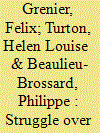

|
|
|
|
|
| Summary/Abstract |
Since the inception of International Relations (IR) within university departments, its disciplinary status has been the subject of constant debate. Yet, the current literature on ‘the state of the discipline’ silences this debate either through IR’s assumed disciplinarity or conflation of debates about theory with the existence of IR. This Forum moves beyond this literature by explicitly engaging whether IR is a discipline or not and by enquiring how this status matters. Contributors rely on the sociology and philosophy of social science to call into question or affirm the disciplinarity of IR to argue whether IR is as a subfield of Political Science, a full-blown and autonomous discipline, or a hybrid field of interdisciplinary studies. Furthermore, contributors reveal the implications of the different disciplinary statuses regarding the academic institution, interdisciplinary possibilities and modes of organizing IR. Overall, these contributions aim to engage rather than close the disciplinary debate, creating further space for reflection.
|
|
|
|
|
|
|
|
|
|
|
|
|
|
|
|
| 13 |
ID:
101475


|
|
|
|
|
| Publication |
2010.
|
| Summary/Abstract |
This article examines the international networks of communication among journals concerned with international security studies. It uses the Web of Knowledge database on which journals cited articles in which other journals over the decade 1999-2008, and on the overall impact of each journal in the field as a whole. We discover a complex set of networks, with different central journals exerting influence both overall and within subnetworks, as well as peripheral journals linked weakly to only a few others. Some subnetworks can be distinguished by methodology or theoretical schools. Subnetworks frequently cross geographical lines, including both European and USA journals. No single journal dominates the field.
|
|
|
|
|
|
|
|
|
|
|
|
|
|
|
|
|
|
|
|
|